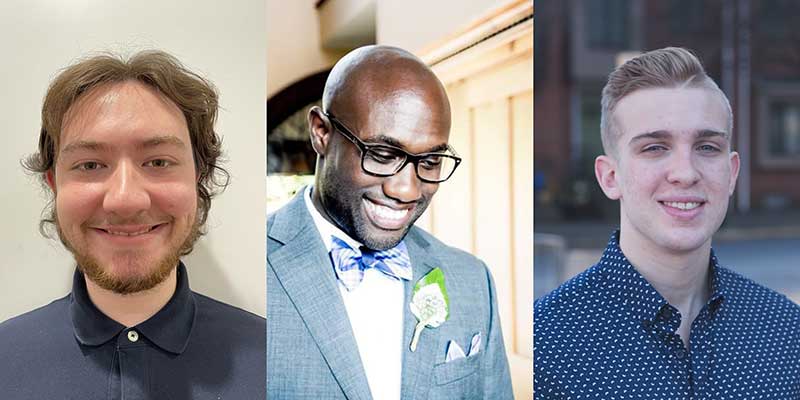At medical-device maker Insulet, co-ops contribute to software tests and microcontroller design
At medical-device maker Insulet, co-ops contribute to software tests and microcontroller design
Author: Madelaine Millar
Date: 03.11.22
In 1922, 14-year-old Leonard Thompson became the first person to receive insulin as a treatment for diabetes. Since then, diabetes has gone from a death sentence to a part of daily life, thanks to rapidly advancing insulin management technology like the Omnipod from medical device maker Insulet. Diabetes is still a serious chronic disease, for some patients even deadly, so any changes to the design of Insulet’s stick-on insulin pump must be carefully tested. That’s where Khoury co-ops like Michael Ruberto come in.
Insulet, located in the Boston area, is a prolific employer of Northeastern co-ops; it even won an employer award from the College of Engineering in 2020. Ruberto—a CS major with a concentration in AI who is set to graduate in 2023—was the first person, though, to fill Insulet’s software test automation co-op position, in the spring of 2021. His experience working on medical devices as part of a small team solidified his interest in the industry, and the tests he helped to build are still helping to ensure the safety of people with diabetes worldwide.
 L to R: Michael Ruberto (Khoury College), Wyman Washington (Insulet), and Alec Warren (College of Engineering). Photos provided by subjects.
L to R: Michael Ruberto (Khoury College), Wyman Washington (Insulet), and Alec Warren (College of Engineering). Photos provided by subjects.
As a software test automation co-op, Ruberto’s day-to-day job mostly involved modifying the Python framework that Insulet uses to run unit tests on the pods’ software and then running those tests. He also had some more autonomous projects, like when he learned to use Android Debug Bridge, a platform to write software and tests for apps on the Personal Diabetes Manager (PDM), an Android device that wirelessly controls how much insulin the Omnipod pump delivers.
“I had to spend a lot of time researching and trying to brush up on that technology, so the experience for me was really enlightening about what it’s like to learn something on the job as opposed to in a classroom environment,” said Ruberto.
College of Engineering student Alec Warren had an embedded software engineering position with Insulet in Fall 2021. He agreed that working at the company allowed for a lot of autonomy. He spent his six months developing a new microcontroller to be used for internal testing, and he managed to get the tool functioning, though not finished, by the end of his co-op.
“(Working on the microcontroller) reawakened my passion for embedded software engineering and working with circuits,” said Warren. “It definitely showed me that I don’t really want to work in front-end design, because it’s just not nearly as fun or fulfilling as what I was doing.”
While technical competency was important to both co-ops’ success, the soft skills they built in their Khoury classes was what nabbed the job. Ruberto found his experience pair programming for courses like Fundamentals of Computer Science 1 and 2 (CS 2500 and CS 2510) gave him a big leg up in learning to work with his small test automation team. His supervisor Wyman Washington was even more impressed with his eagerness to learn.
“From the outset, I really enjoyed that Michael asked a lot of questions. He wasn’t afraid to admit something when he didn’t know,” said Washington, a senior staff software engineer at Insulet. Had Ruberto wanted to do another co-op at Insulet, Washington “would have loved to have him back.”
While he didn’t end up going back, Ruberto’s experience developing tests for the Omnipod software solidified his desire to work in the medical device industry. It has also pushed him to seek out more opportunities to work on small teams like Washington’s. He’s currently doing his second co-op at Remix Therapeutics, which develops small molecule therapies designed to reprogram RNA processing.
“Part of what drew me to (Remix Theraputics) is the team I was working in at Insulet was very tight knit,” said Ruberto. “That showed me I did really enjoy that environment and working in a small group.”
The work Ruberto did at Insulet has had an impact even after he’s gone. One hundred years after the first successful diabetes treatment with insulin, the testing Ruberto developed using Android Debug Bridge is still ensuring the quality of the pods used by a quarter of a million people, including Khoury News’ own Jane Kokernak, senior communications advisor at the college. She remarked the her Omnipod insulin pump system does more than sustain life: “Its simple design and reliability give me peace of mind when it comes to my diabetes.”
Ruberto encouraged other Khoury College students to apply to the software test automation co-op at Insulet, particularly if they prefer to work collaboratively.
“I really enjoyed (Insulet), and I would definitely recommend working there,” said Ruberto. “Everybody who I worked with there was great to work with, and it was a really supportive environment.”
Subscribe to the Khoury College newsletter
The Khoury Network: Be in the know
Subscribe now to our monthly newsletter for the latest stories and achievements of our students and faculty